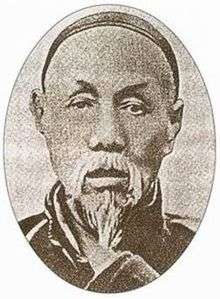Lin Shu

Lin Shu (Chinese: 林紓, November 8, 1852 – October 9, 1924), courtesy name Qinnan (琴南), was a Chinese man of letters, most famous for his introducing Western literature to a whole generation of Chinese readers, despite his ignorance of any foreign language. He collaborated with others to translate eventually more than 170 titles, mostly novels, from English or French into Literary Chinese.
Biography
Lin was born in Fuzhou and died in Beijing. In 1897 his wife died and urged by his friends, who wanted to distract him from his bereavement, Lin undertook the translation of Alexandre Dumas's La Dame aux Camélias. Wang Shouchang (王壽昌) (1864–1926), who had studied in France, interpreted the story for his friend and Lin put what he heard into Chinese. The translation (Chinese: 巴黎茶花女遺事; literally: "Past Stories of the Camellia-woman of Paris") was published in 1899 and was an immediate success. Lin went on to translate more.
Lin himself describes, in his translator's preface to Dicken's The Old Curiosity Shop (Chinese: 孝女耐兒傳; literally: "Biography of the Filial Daughter Nell"), how he worked on his translations:
| “ | I have no foreign languages. I cannot pass for a translator without the aid of several gentlemen, who interpret the texts for me. They interpret, and I write down what they interpret. They stop, and I put down my pen. 6,000 words can be produced after a mere four hours' labour. I am most fortunate to have my error-plagued, rough translations kindly accepted by the learned. (予不審西文,其勉強廁身于譯界者,恃二三君子,為余口述其詞,余耳受而手追之,聲已筆止,日區四小時,得文字六千言。其間疵謬百出,乃蒙海內名公,不鄙穢其徑率而收之,此予之大幸也。) | ” |
Lin's translations were much forgotten until the essay "Lin Shu's Translations" (Chinese: 林紓的翻譯) by Qian Zhongshu appeared in 1963. Since then the interest in Lin's translations has been revived. In 1981, the Commercial Press (Chinese: 商務印書館; pinyin: Shāngwù yìnshūguǎn), the original publisher of many of Lin's translations, reprinted ten of Lin's renditions (in simplified characters, with modern punctuations).
In his essay, Qian Zhongshu quoted Goethe's simile of translators as geschäftige Kuppler, and stated that Lin Shu served well as a matchmaker between Western literature and Chinese readers, as he himself (a most avid reader of western books) was indeed motivated by Lin's translations to learn foreign languages. Qian also pointed out that Lin Shu often made "improvements" to the original as well as abridgments. According to Qian, Lin Shu's career, which lasted almost 30 years, can be divided into two phases. In the first phase (1897–1913), Lin's renditions were mostly vigorous, despite all the mistranslations. After that, Lin's renditions were dull, serving only as a means to eke out a living.
The following is Lin's rendition of the famous opening of David Copperfield:
| “ | 大偉考伯菲而曰:余在此一部書中,是否為主人翁者,諸君但逐節下觀,當自得之。余欲自述余之生事,不能不溯源而筆諸吾書。余誕時在禮拜五夜半十二句鐘,聞人言,鐘聲丁丁時,正吾開口作呱呱之聲。(Whether I shall turn out to be the hero of my own life, or whether that station will be held by anybody else, these pages must show. To begin my life with the beginning of my life, I record that I was born (as I have been informed and believe) on a Friday, at twelve o'clock at night. It was remarked that the clock began to strike, and I began to cry, simultaneously.) | ” |
The sinologist Arthur Waley held a high opinion of Lin's translations, suggesting they are not inferior to Dickens' originals:
| “ | To put Dickens into classical Chinese would on the face of it seems to be a grotesque undertaking. But the results are not at all grotesque. Dickens, inevitably, becomes a rather different and to my mind a better writer. All the overelaboration, the overstatment and uncurbed garrulity disappear. The humour is there, but is transmuted by a precise, economical style; every point that Dickens spoils by uncontrolled exuberance, Lin Shu makes quietly and efficiently. | ” |
During the New Cultural Movement, Lin Shu was much smeared and ridiculed as a defender of Literary Chinese. He didn't oppose the use of Vernacular Chinese (indeed he wrote a number of poems in the vernacular language), but he could not agree on the total abolition of Literary Chinese as was proposed then.
References
- Waley, Arthur (1958). "Notes on Translation", The Atlantic Monthly, the 100th Anniversary Issue.
- Xue Suizhi 薛绥之 Zhang Juncai 张俊才 (ed.) (1983). Lin Shu yanjiu ziliao (林纾研究资料 "Material for the study of Lin Shu"). Fuzhou: Fujian renmin chubanshe.
External links
- (Chinese) Biographical sketch and some of his works
- (Chinese) Qian Zhongshu, "Lin Shu's Translation"
- (Chinese) Yang Lianfen, "Lin Shu and the New Culture"